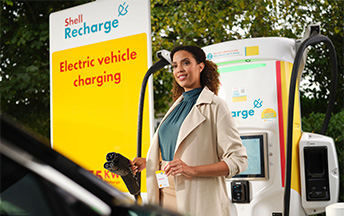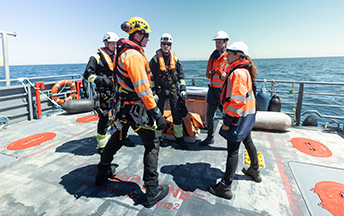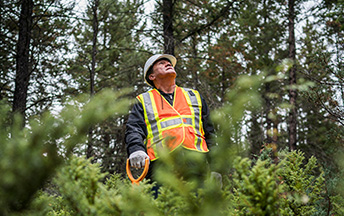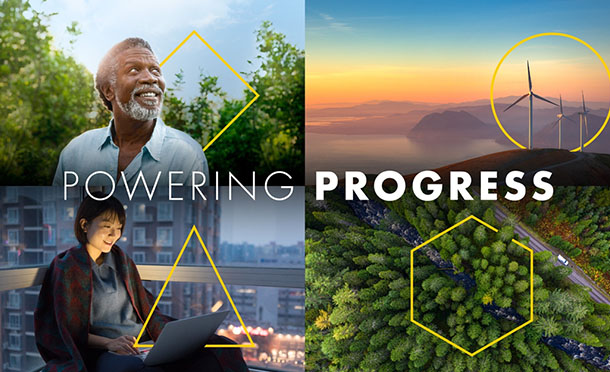Our Powering Progress targets
In February 2021, Shell launched Powering Progress, which sets out our strategy to accelerate the transition of our business to net-zero emissions, purposefully and profitably. It is designed to integrate sustainability with our business strategy, in support of our purpose – to power progress together by providing more and cleaner energy solutions.
Socio-economic, political and market factors sometimes affect our portfolio choices. While no decisions have been made, existing global business targets are currently under review, as part of normal strategy evolution. We expect to provide further insights during our Capital Markets Day in June 2023. Read more in the cautionary note.
Selected targets and commitments under Powering Progress include:
Working with our customers and across sectors to accelerate the transition to net-zero emissions.
- Shell’s climate target is to become a net-zero emissions energy business by 2050.
- Our targets include reducing our absolute Scope 1 and 2 emissions by 50% by 2030 compared to 2016 levels, on a net basis, and reducing the carbon intensity of the energy products we sell by 6-8% by 2023, 9-12% by 2024, 9-13% by 2025, 20% by 2030, 45% by 2035 and 100% by 2050.
- In 2022, we linked the pay of more than 16,500 staff to our target to reduce the carbon intensity of our energy products by 9-12% by 2024, compared with 2016.
- We have committed to eliminate routine gas flaring from our Upstream-operated assets by 2025.
- We have set a target to keep our methane emissions intensity for operated oil and gas assets (including liquefied natural gas) below 0.2% by 2025.
Protecting the environment, reducing waste and making a positive contribution to biodiversity.
Biodiversity
- Our ambition is to have a positive impact on biodiversity.
- Our new projects in areas rich in biodiversity – critical habitats – will have a net positive impact on biodiversity, starting implementation in 2021.
- Our nature-based solution projects, which protect, transform or restore land, will have a net positive impact on biodiversity, starting implementation in 2021.
- We will replant forests, achieving net-zero deforestation from new activities, while maintaining biodiversity and conservation value, starting implementation in 2022.
Water
- Our ambition is to conserve fresh water by reducing consumption and increasing reuse and recycling.
- We will reduce the amount of fresh water consumed in our facilities, starting by reducing fresh-water consumption by 15% by 2025, compared with 2018 levels, in areas where there is high pressure on fresh-water resources.
Circular economy and waste
- Our ambition is to use resources and materials efficiently and to increase reuse and recycling.
- We are aiming for zero waste by reducing waste generated and increasing reuse and recycling in our businesses and supply chains. We aimed to set goals for waste reduction, reuse and recycling by the end of 2022.
- We will work with our suppliers and contractors to help end plastic waste in the environment:
- By 2030, we will increase the amount of recycled plastic in Shell-branded packaging to 30% and ensure that the packaging we use for our products is reusable or recyclable.
- We will increase the amount of recycled materials used to make our products, starting with plastics.
Air quality
We are helping to improve air quality by reducing emissions from our operations and providing cleaner ways to power transport and industry.
Collaboration and reporting
We are strengthening external partnerships and improving transparency on performance.
- Supply chain: We will include requirements in our purchasing policies to reflect our environmental framework, and take the energy efficiency, material efficiency and sustainability of products into consideration in our purchases.
- External partnerships: We will ensure external partnerships inform key areas of development and delivery of our ambitions.
- External reporting: We will transparently report performance in our annual Sustainability Report.
Improving people's lives through our products and activities, contributing to local communities and championing inclusion.
- In line with our Powering Progress strategy, Shell is striving to bring reliable electricity to people in emerging markets who do not yet have it.
- Shell is working towards achieving 35% representation of women in our senior leadership positions by 2025 and 40% by 2030.
- We aim to increase racial and ethnic representation across our workforce so that we better reflect the communities in which we work and live.
- At Shell, we seek to provide a safe, caring and inclusive environment for LGBT+ and PWD (people with disabilities) staff so that they can be themselves and reach their full potential.
- By 2030, we will make our global network of service stations more inclusive and accessible to customers with physical disabilities.










